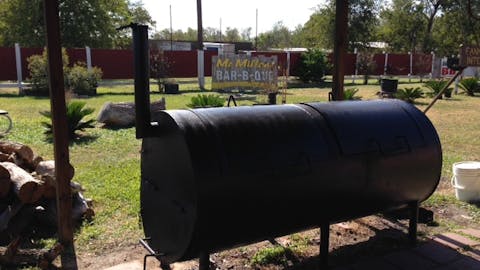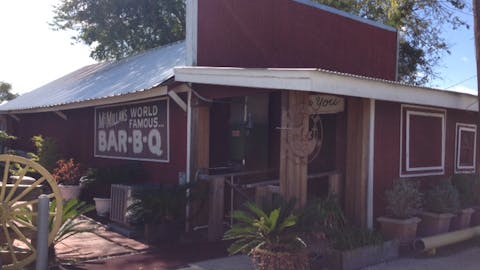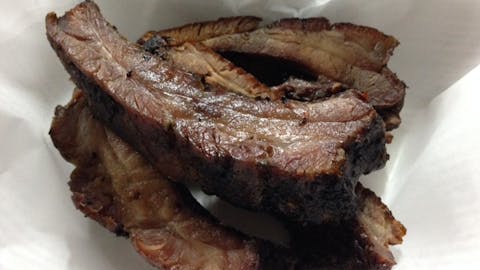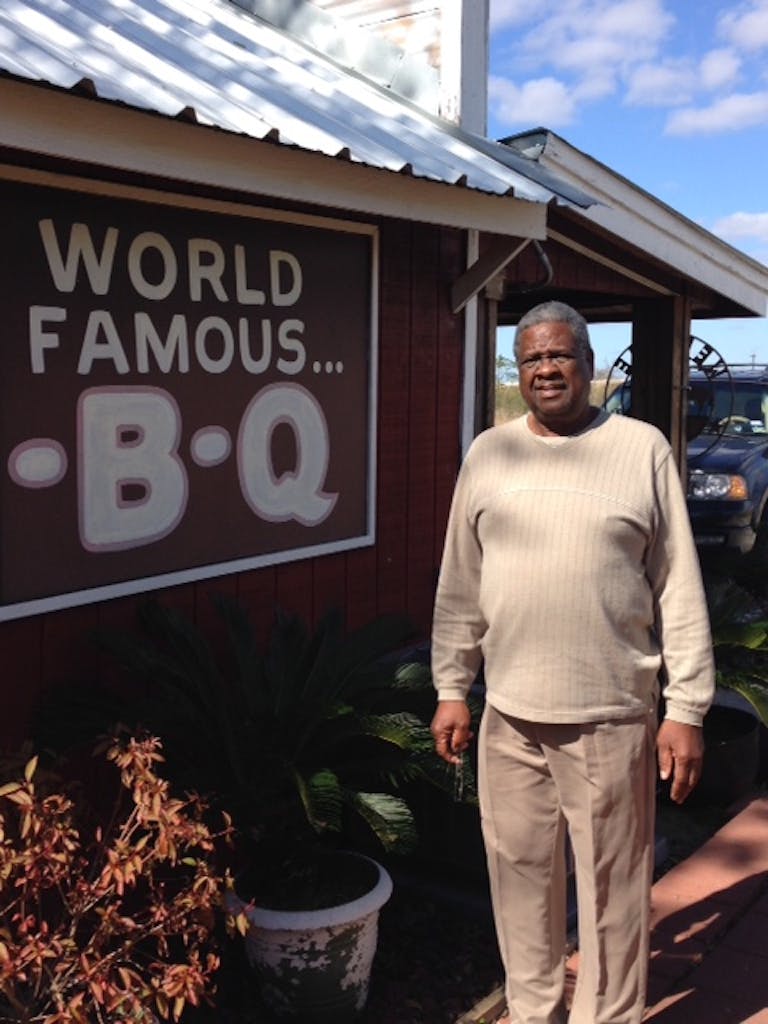 Owner/Pitmaster: McMillan’s Bar-B-Q; Opened 1974
Owner/Pitmaster: McMillan’s Bar-B-Q; Opened 1974
Age: 69
Smoker: Wood-fired Offset Smoker
Wood: Oak, Mesquite, and Pecan
Louis McMillan wasn’t happy, and I knew he wouldn’t be. I was in his restaurant to interview him because he’d been honored as one of Texas Monthly’s Top 50 BBQ joints, but we had a longer history. While traveling for my book research a few years ago I’d stopped into McMillan’s for a less than impressive meal and I wrote about it. I included a bit about my conversation with Louis from back then. “I’ve said before that humility and good barbecue go together. There’s little of it that comes out of Louis McMillan.” That was before calling his barbecue “decidedly poor.”
Other visitors to McMillan’s had told me about the bad reputation I had here. Not surprisingly, McMillan wasn’t happy with his or his food’s portrayal in the book. His inclusion in the Top 50 did little to temper his unhappiness.
I had ordered a combo plate from the sole employee working who assured me that McMillan would return soon. I was waiting in the dining room when he arrived and I asked if he had time for an interview with Texas Monthly. “Do you know Daniel Vaughn?” he asked with a scornful look. I introduced myself and turned on the recorder.
Louis McMillan: There is nothing I don’t know about barbecue. Let me tell you, nothing. Ask me any question about pork, beef, chicken, ribs, prime rib…I want to show you something to give you an idea about me and my status. I had a company call me from Louisiana. They said “Mac, I want you to go out there and feed twenty people a prime rib steak.” How much do you think I charged for twenty ribeye steaks? $3000.
Daniel Vaughn: That’s some expensive ribeye steak. I hope it was good.
LM: The best of the best. I’m going to do a $50,000 Christmas party for Halliburton feeding four hundred people prime rib. I’m not upset because I know Louis McMillan, and I know how good I am. I one of the best of the best.
DV: You’ve certainly been at it a long time. When did you open this place?
LM: 1974.
DV: In this building?
LM: No. I started in another building. I once had four locations at one time.
DV: Were they all in this area?
LM: Yeah. Now I have this one location. I’m sixty-nine years old and I don’t want to work as hard. I make tons of money.
DV: When did you get down to just this location?
LM: In 2000.
DV: How have things been going here in Fannin?
LM: Great. I love what I do and I do what I love. I’m not just average. Let me tell you what I tell my employees when they walk in here. “If you don’t give me 98%, then I don’t need you.” Every day.
DV: How many employees do you have?
LM: I have five employees. I’m a caterer. If I have a big catering job, I could have as many as fifteen.
DV: Out in this location, you’re a destination. There’s not too many people who would just happen upon it, so how much of your business is here at the restaurant versus catering?
LM: 60% here and 40% catering. People walk in here and wherever they’re from, when they come back they put a dollar on the wall. I’ve got some people who drive from Houston, who drive from Dallas, who drive from Austin…I got a guy who drives here from Arkansas. I’ve heard about Aaron Franklin. He’s a young man and he’s going up, but do you know why you give him all the hype?
DV: Tell me why.
LM: He’s in Austin. I think he’s good, but I don’t think he’s any better than I.
DV: So you’ve been there?
LM: I haven’t been there. I’ve had people bring me some stuff. I don’t want to knock my competition. I show my competition. I show the what I can do, how I can do it, and why I do it. Aaron uses post oak wood, is that right?
DV: Yes.
LM: You know what I use? Oak, mesquite, and pecan. I use two different kinds of oak. I’ve got a wood out there that you’ve probably never seen before – a white oak. Have you ever seen white oak before?
DV: Yes. They use it a lot in California. Do you use all of those together for everything, or do you have specific woods for each meat?
LM: On brisket I cross-burn. I use it all, but on chicken I specialize. I cook with mesquite and pecan. Pecan neutralizes mesquite because mesquite is a strong wood. Pecan makes it pleasant. I’m telling you, in forty years you can’t ask me anything I don’t know. I hear people saying they can cook a rib in two hours, but you don’t even kill the salmonella in two hours. I have the education and the experience. Can I tell you the best wood to cook with?
DV: Which one?
LM: For cooking smoking or whatever it’s cherry wood. Hickory wood is strong, but cherry wood is awesome. There aren’t too many pitmasters in Texas that have cooked with cherry wood. The smell of it…oh man.
DV: If you’re sixty-nine now, and you started this in 1974, you must have done some barbecue before you opened here.
LM: I worked behind a guy when I was nine years old who was a barbecuer. They didn’t have pitmasters, they just had a guy that cooked meat.
DV: Where was that?
LM: In West South Texas. There’s a big write-up about me from West South to the Smithsonian. I think they might have mentioned that I was chosen by Texas Monthly. Anyway, in West South Texas you’d dig a hole in the ground and put a screen over that. You put your wood in the hole, and you cook in the hole. I came from the hole to direct cooking to indirect cooking to the firebox to cross cooking. How long do you think it would take you to make a quality brisket?
DV: That all depends on your it temperature and the size of the brisket, but a twelve pound brisket…what is your pit temperature?
LM: I kill all the E. coli for two hours at 289 degrees, then I drop it down to 225 degrees and I slowly cook it there for about fourteen or fifteen hours.
DV: That’s low and slow.
LM: That’s the difference between barbecuing and smoking meat. You do agree?
DV: That depends on who you’re talking to. There are some who say that if you’re not cooking over direct heat, then it’s not barbecue.
LM: They don’t know what they’re talking about. Over direct heat at 225 degrees, in fourteen hours you’ll burn that brisket up. It can’t take it. I bet Aaron Franklin uses a firebox. Does he?
DV: He uses an offset smoker, yes.
LM: Let me tell you what I think about Aaron.
DV: You mean about that three-hour-old brisket you ate?
LM: I think when you’ve got to wait in line for three or four hours for brisket, that’s all hype.
DV: But “hype” suggests that the end product isn’t very good.
LM: Hype can mean a lot of things, but I think Aaron has good technology which he learned from somebody else. I learned mine from somebody else but I brought it to perfection because I made it happen. I learned to cook when I was nine, but I perfected it. At twenty-five I was in the ballpark hitting singles, but today I hit a homerun. Any time I put meat on the pit it’s there for fifteen hours, and if it’s not right we won’t serve it.
DV: Was there a point where you felt like you’d perfected it? Was there and a-ha moment?
LM: I perfected it back in 2000. I was getting better and better. It’s a learning process. You don’t hit a homerun every time you go to bat. I was at bat for twenty years before I perfected it. You can come from all over the world, and I will cook against anybody in the world, and I will be in the ballpark.
DV: Back when you were nine years old, what was on the pit?
LM: We were cooking portions of lamb, chicken, brisket, some sausage, cabrito. [He yells to the kitchen] Mumphord, get out here and sit in on this interview. This guy right here [pointing to his employee Mumphord], I brought him in to my business three months ago. He is learning my system. He told me he was a pitmaster when he got here, and I told him “Bullsh—! You’re a pitmaster once I tell you you’re a pitmaster.”
DV: He’s a pitmaster-in-training?
LM: No. He’s a cook-in-training. You know what you’ve got to do to be a pitmaster? A pitmaster has to cook two hundred pounds of brisket, ten chickens, one ribeye, one sausage and they’ve got to come out perfect. Perfect is 98%. If you can do that you’re not a pitmaster. I can look at the smoke and tell you if it’s cooking right. I do a dry rub and a marinade. You’ve got to do both of them. I can compete with the boys up the street, down the street, and around the corner. It doesn’t matter.
DV: What’s the marinade?
LM: Oh. You want to know the marinade? I use vinegar, margarine, Coca-Cola…do you know why I use Coca-Cola?
DV: For the sweetness.
LM: No. For the acidity. It breaks the tissue down of the brisket.
DV: Does that go on all the meats?
LM: It just goes on the brisket. Chicken is easy to cook. Do you know what the most difficult cut of meat to cook is?
DV: I don’t know. Brisket is pretty difficult.
LM: When you take a brisket from a raw state and put it on that pit and cook it sixteen hours, and you run out every other day, well I run out about every day. I’m isolated out here. People don’t know where I am. I don’t even advertise.
DV: I saw a billboard on the highway.
LM: Yeah you saw a billboard because people said I need to put my phone number out there. My best advertising are guys like you that come in and eat. If it’s no good you don’t have to pay for it. I’ve got customers all over the world.
DV: You cooked up in Washington too. How did that come about?
LM: This lady came out here and she said “I’ve got some guys coming here from New York and Washington.” She owned a hunting lodge down the road. They came in here and wanted prime rib and an assortment of meat. They said “you’ve got to give this guy to come to Washington D.C.” She did it. She called someone at the Smithsonian and said “go down and interview McMillan”. That was in 2008.
DV: Where did you cook?
LM: On the National Mall.
DV: What was the event?
LM: It was the Smithsonian’s Folklife Festival, and they wanted barbecue.
DV: Were there others cooking barbecue there?
LM: Well there were some others cooking hotdogs and hamburgers. I’ll tell you what, I’ll put a hamburger joint out of business. People might have an appetite for a hamburger, but if you give them a brisket sandwich, it’s qualitative, they’d never go buy a hamburger.
DV: Good smoked meat is hard to beat.
LM: I like your style. You’re a good writer, but sometimes you’re a critic on some of the barbecue places. When you rate a barbecue place of this nature and you tell me I get a 4.0 on a 5.0 system, then you go down the road and you give someone in the valley that I’ve never heard of a 4.5, that’s bulls—. Nobody in the valley can cook like me.
DV: Just because you haven’t heard of them doesn’t mean they’re not any good.
LM: I check them all out. Them boys in Lockhart, you know who’s the best in Lockhart? Chisholm Trail.
DV: They’re certainly the best value.
LM: I’m not looking for value, I’m looking for quality. I buy quality. Value doesn’t excite me.
DV: It sounds like you’re more unhappy about the 4.0 rating than you are happy about being on the Top 50 list.
LM: Let me tell you, the Top 50 doesn’t make me any money. Catering makes me money. How about that Tootsie at Snow’s. Is their meat any good?
DV: I haven’t had a bad brisket there.
LM: But they wrap their meat, right?
DV: Yes.
LM: If a person wraps their meat you shouldn’t even grade them. That’s a cheat. To me you’re killing the smoke and the smoke ring. I don’t use foil. I wouldn’t grade places that use a gas pit too.
DV: What kind of brisket do you cook with?
LM: I use a Choice brisket. It’ll give you the marbling. Some people think Prime, but if you serve them Prime you’re going to give them a lot of fat. Some people like Select because of the cost, but I use Choice.
DV: What are you paying for brisket?
LM: Let me tell you what I started in 1974 it was $0.39 per pound. Now it’s running about $4.00 per pound. It has doubled in price in the last year.
DV: Have you had to raise your prices?
LM: I started out at the first of the year at $10.95 and I’m at $16.95 now.
DV: From 1974 up to now, how has your cooking changed?
LM: Back in ’74 we were cooking direct mostly. Now you can’t cook it direct. You’ve got to cook it indirect.
DV: Most of them that do direct heat wrap the meat in foil at some point during the cooking.
LM: I don’t believe in wrapping in foil. I don’t believe in wrapping in butcher paper. I believe in putting it on the pit and cooking it low and slow.
DV: What made you decide to move here to Fannin and open a barbecue joint?
LM: I owned some land down the road and I wanted to be in the country where I could burn a fire on the outside and I didn’t have the EPA raising hell.
DV: When you were nine you were cooking lambs and goats. When did the shift happen to cooking briskets?
LM: When I got back from college. I went to Prairie View A&M College and played baseball on a scholarship. I was the catcher, which is the quarterback of a baseball team. I wanted to be on top or near the top. I’m not an arrogant person, but I believe in what I believe in. I’m a direct person. When you know something, you know it. Let me tell you the difference between our cooking and Carolina barbecue. Carolinas basically cook pork. When you say brisket in Carolina, they’ve never heard of it. They get confused. Do you think I’m a critic? I’m a critic about barbecue because it’s a field that I think I perfected. People leave Victoria where they paid $12.95 per pound for brisket and come out here to pay $16.95. You can’t cook brisket over direct heat. The key thing is that you’ve got to break the tissue down. You said in one of your things that I didn’t render the fat.
DV: I remember that slice of brisket distinctly. That fat was some of the hardest unrendered fat I can remember. I can picture that thick slice of brisket now.
LM: Was I here that day? Did you talk to me?
DV: Yes.
LM: I remember you said the owner liked to talk.
DV: Yeah, but you wouldn’t dispute that, right?
LM: No, I won’t dispute that, but I know what I’m talking about. Some people just talk to talk, but when I talk about something I can tell you what it’s about. It’s going to be a quality conversation. I don’t BS. What did you order?
DV: [Opening my to go container] Brisket, ribs, and sausage.
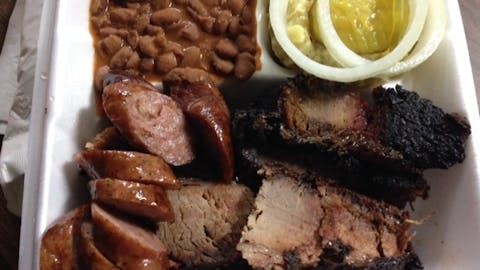
LM: Moist brisket?
DV: I just asked for brisket.
LM: I want to look at that brisket to see if it has any fat on it. That brisket is pretty lean. [He tells Mumphord to get a few fatty slices from the kitchen].
DV: You know Aaron Franklin’s brisket is good from one end to the other.
LM: You’ve got no fat on the front end.
DV: How often do you cook the briskets?
LM: Every day. The ribs, I wasn’t here this morning when they were pulled. I would have never served that rib.
DV: That’s the hard part about not doing everything yourself.
LM: That is the hard part. That’s why I’m training them. That rib wasn’t mopped enough.
DV: Is the mop just for the ribs?
LM: It’s for everything.
DV: A rub, a marinade, and a mop. I guess you’re always seasoning.
LM: Always seasoning. Now, what’s the difference between that moist brisket and the lean brisket?
DV: You can see the difference. The lean is really dry. The moist has better smoke flavor too.
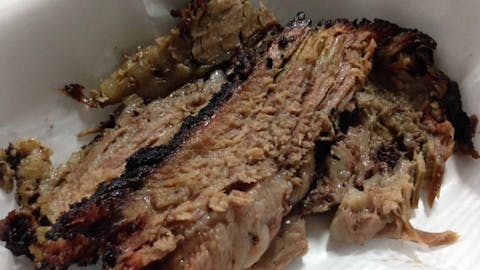
LM: He gave you a dry piece of brisket from the front end.
DV: But you cooked it, right?
LM: Yes, but the front end of the brisket is a thinner piece of meat. If I’d have been here taking your order I would have asked you if you wanted the dry or moist end. Most women want the lean meat. Most men want a little fat because they don’t want the sauce. The sauce doesn’t make the meat, it just enhances the meat. Let me tell you something about employees. He should have never served you that rib. He’s gotta know.
DV: But these ribs were cooked yesterday.
LM: They came off last night.
DV: Is there any one meat that you think is your specialty?
LM: I like to think I’m in the ballpark with all of it. I try hard on brisket because I know people in Texas love it. The ultimate thing that has to be there is taste. If it doesn’t taste good, it’s no good.
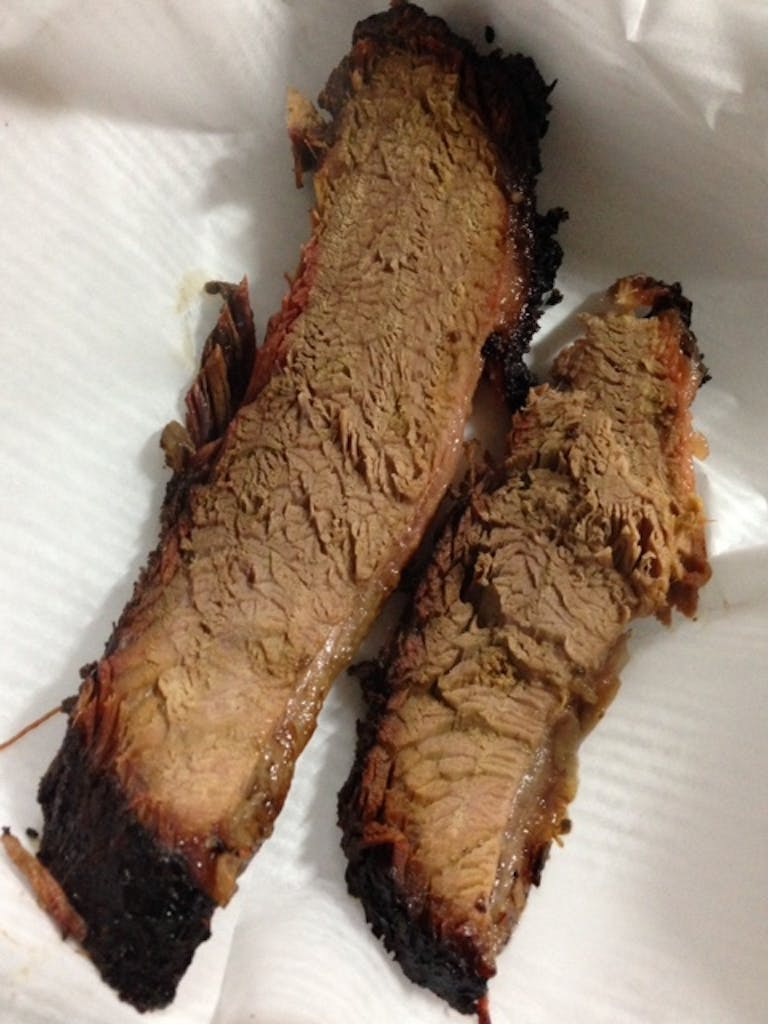
DV: At sixty-nine years old, have you thought about who might take over for you when you retire?
LM: I’ve had some guys who want to buy, but I might just shut it down and walk out. I’m not looking for the money. I’m looking for this place being remembered as the place where Louis McMillan cooked. The next time you come by for the next Top 50 here it’s doubtful I’ll be in business. I mean you work for forty-five years…I’ve got some other stuff I need to do. Sometimes enough is enough.
- More About:
- Black BBQ


